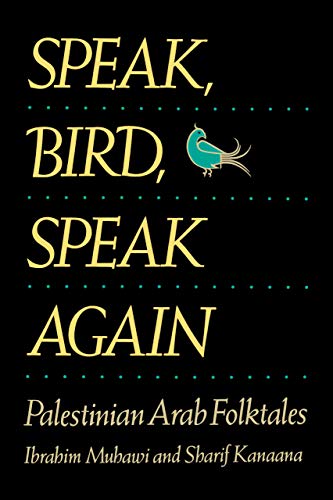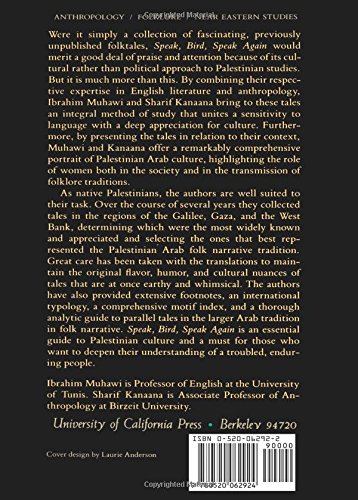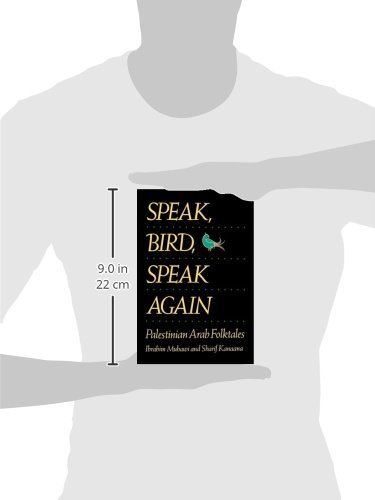



Speak, Bird, Speak Again: Palestinian Arab Folktales (World Literature in Translation)
A**D
Great read for those interested in Palestinian Culture and Folklore
This book is fascinating. Definitely not stories for kids as I thought they might be, but they were really interesting. At first I was kind of annoyed by all the footnotes but they really help to clear up some parts of the stories, and they are very interesting tidbits of information. I haven't finished the book yet, only about half, but I'm loving it!
2**K
Palestinian Folk Tales
Not what I expected, and definitely not fairy tales to be read to children - many sexual references. Heavy with footnotes as if possibly a dissertation project.
G**A
Wonderful Collection of Fairy Tales
This wonderful book introduces Palestinian culture to the world. In the footsteps of the brothers Grimm, Ibrahim Muhawi and Sharif Kanaana roamed all over Palestine collecting folktales from the old people. The major difference setting this work aside is highly methodical approach of its authors and the depth of their perceptions and analyses. Perhaps this is not surprising given their qualifications - one a leading Palestinian social scientist, the other a leading humanist. The tales were selected based on their popularity as well as their excellence, and so very much represent the culture they come from. The authors themselves exhibit a deep understanding of traditional Palestinian culture, which is transmitted to the reader in the introduction. Each tale is accompanied by a modest set of footnotes where necessary, commenting on linguistic features. Furthermore, every few tales are followed by a commentary section relating the tales to Palestinian culture, and a detailed folkloristic analysis section concludes the book. This gem of a book can thus be read on many levels, from the serious scholar in comparative folktales, to the student of Palestinian studies, to the ordinary parent wishing to read good stories to their kids. The book is structured such that the commentary and analysis sections can be safely skipped. Nevertheless, I found those sections quite fascinating and well-written, using easy to understand language but reflecting deep insight and understanding.The translation is excellent, making the tales sound as ordinary in English as they sound in the original Arabic. I have read other translations of Palestinian folktales (e.g. by Rafael Patai) that attempt a literal translation, and as a result, those translations sound extremely awkward in English and not fun to read. Speak Bird, Speak Again is also infinitely superior to Patai's book in its author's understanding of Palestinian culture and the colloquial Arabic language used (Patai makes many obvious mistakes in translating common idioms and expressions). Speak Bird Speak Again is therefore highly recommended to anyone with interest in Palestine or simply with a craving for good stories. The collection in this book represents the last versions of tales that are dying out as a result of the deep social and political changes that have affected Palestinian society as a result of Western colonialism.
D**
Please Read This Book
Please read this book. Strange to begin a review with an appeal. Here's why: There is great tension between the Arab-Muslim world and others, and this book offers insights other books won't offer you. The authors are themselves Arabs and scholars from the Middle East. The book's 48-page introduction offers a detailed peek into traditional, Muslim, Arab, peasant culture. The folktales in the anthology are delightful. They could be enjoyed by children and savored by adults. There are lighthearted humor, adventure, deep morals, glittering rewards, and, again, insights into Muslim life. If you liked Cinderella, in any of her retellings - and who doesn't like Cinderella - you'll love these tales.The Politically Correct Thought Police insist that any criticism of Islam must be condemned as that highly suspect, all too convenient neologism, "Islamophobia." The Politically Correct Thought Police are fully of baloney, and resistance to them is highest virtue. I am Spartacus, and you are, too.Of course you can critique Islam and still not hate Muslims, indeed can like and even love Muslims. How do I know? Many of my most beloved family members were not only Communist Party members, they were local leaders in the CP in (the then so named) Czechoslovakia. I criticized Communism. I marched in anti-Soviet demonstrations. And I loved my Communist relatives. They criticized my belief systems: capitalism, Western Democracy, Catholicism. And they loved me. Yes, you can critique a person's, or a polity's, belief system, and still like, love, or be peacefully indifferent to those who adhere to that belief system.In any case, yes, you should read Robert Spencer to understand what the mainstream press is not telling you about Islam. But you should also read this book to cultivate a genuine love of the aspirations, honor, complexity and full humanity of traditional, Muslim, Arab culture.Understanding its treatment of women is central to understanding Islam, and Muhawi and Kanaana offer deep and unapologetic insight into Islam's treatment of women.As the late, great folklore scholar Alan Dundes demonstrated, folklore reveals the suppressed desires of those who disseminate it. In Arab folktales, Muslim women reveal how they really feel about polygyny, the practice of one man taking more than one wife. Polygyny, the authors state, "more than any other institution or practice, represents the power of men over women" (14). Women are not happy with it, and in folktales told by women, polygynist husbands pay a price for their lack of fidelity to one wife. "In none of the tales is polygyny presented in a good light" (14). Muslim women reveal how they feel about the favoritism bestowed on male children. In the tales told by women, in contrast to real life, families celebrate the birth of daughters (18). In the tales, female characters reveal an intelligence, an adventurousness, an ability to solve problems, denied them in real life. As the authors put it: "The tales empower the women who narrate them to traverse, in their speech, the bounds of social convention" (12).In the tales, as opposed to real life, women are active and men are passive (18, 36). In the tales, in contrast to real life, women pursue romantic and sexual encounters, choose their own husbands, and experience and value romance, rather than just submitting to sex as part of marital obedience and a way to increase the number of people in a clan, thus increasing its power (27, 32, 34). In the tales, women take lovers, and behave "permissively and playfully" with them (35). In spite of the strictures that Islam imposes on women's freedom of movement, in the tales, women undertake journeys (31).The authors identify women as "the other" in Muslim, Arab culture (14). Important social bonds are between men. Women's outsider status is marked by their never taking their husband's names. They are not, strictly speaking, part of the very households in which they live. "At no time in her life is a woman considered to live in her own space ... [women] are considered strangers" in their own homes (17). The patriarch's control of "his" females is so all pervasive that "mother's milk belongs not to her but to her husband" (37).The authors' helpful comments also emphasize the importance in Muslim, Arab culture on the collective as the basis of society, not the individual, and the emphasis on fate: "Each person's fortune is written on the forehead at the moment of birth" (44).The tales are, simply, wonderful. The heroes are clever - one sits between thorn bushes and under a dripping bag of water to keep from falling asleep - the ghouls and genies are scary, and the treasures are worth all the adventure it took to gain them. The total enjoyment a non-Muslim, non-Arab reader can gain from these tales is testimony to our common humanity.
B**L
Symbolism
I am presently taking a graduate class, which deals with orientalism, and we are using this book as a reference. I found the introduction to be a wonderful insight into the Arabian mind. The stories are short, well written, and whimsical. I enjoy each story, in itself and also its symbolism with other stories in the book. There are also "Afterwords" that explain the complexities of the stories and the Arabian culture.
E**Y
Arabian Tales like Grimm's Stories
This is a wonderful book of Palestinian folk tales that takes the reader into an Arab world that is at once similar to and at the same time very different from the world of Grimm's Fairy Tales with its mixture of magic spirits and domestic scenes. I felt I was given a glimpse of the kind of stories that are part of one aspect of Arab culture.
D**R
Beautiful Palestinian legends
Beautiful Palestinian legends
G**Y
Warmth
Truly wonderful
Trustpilot
2 weeks ago
4 days ago